BSBFIM501 Manage budgets and financial plans
![]()
This Student Assessment Booklet includes all your tasks for assessment of BSBFIM501 Manage budgets and financial plans.
About Your Assessments
This unit requires that you complete three assessment tasks. You must complete all tasks to achieve competency for this unit.
Assessment Task About This Task
Assessment Task 1: Written Students must correctly answer all questions in this task to demonstrate Questions that they understand the knowledge required of the unit.
Assessment Task 2: Project Students will negotiate a budget with another staff member, develop Plan and Implement Budget contingency plans and then distribute to staff.
Assessment Task 3: Report Students will monitor and report on budget expenditure and undertake Monitor, Control and Review financial process improvements. Financial Processes
How to Submit Your Assessments
When you have completed each assessment task you will need to submit it to your assessor by the due date.
Instructions about submission can be found at the beginning of each assessment task.
Make sure you retain copy of your written activities before you submit those. Your submission to the assessor will keep into your student file. These will not be returned to you.
Assessment Task Cover Sheet
a. At the beginning of each task in this booklet, you will find an Assessment Task Cover Sheet. Please fill it for each task, making sure you sign the student declaration.
b. After assessing your tasks, your assessor will provide you feedback.
Assessment Appeals
You can make an appeal about an assessment decision by putting it in writing and sending it to us. Refer to your Student Handbook for more information about our appeals process.
Assessment Plan
The following outlines the requirements of your final assessment for this unit. You are required to complete all tasks to demonstrate competency for BSBFIM501 Manage budgets and financial plans.
Your assessor will provide you with the due dates for each assessment task. Write them in the table below.

Read through the assessments in this booklet before you fill out and sign the agreement below. Make sure you sign this before you start any of your assessments.
|
Have you read and understood what is required of you in terms of assessment? |
Yes |
No |
|
Have you read and understood the RTO’s policies and procedures related to reassessment? |
Yes |
No |
|
Do you understand the requirements of this assessment? |
Yes |
No |
|
Do you agree to the way in which you are being assessed? |
Yes |
No |
|
Do you have any special needs or considerations to be made for this assessment? If yes, what are they? |
Yes |
No |
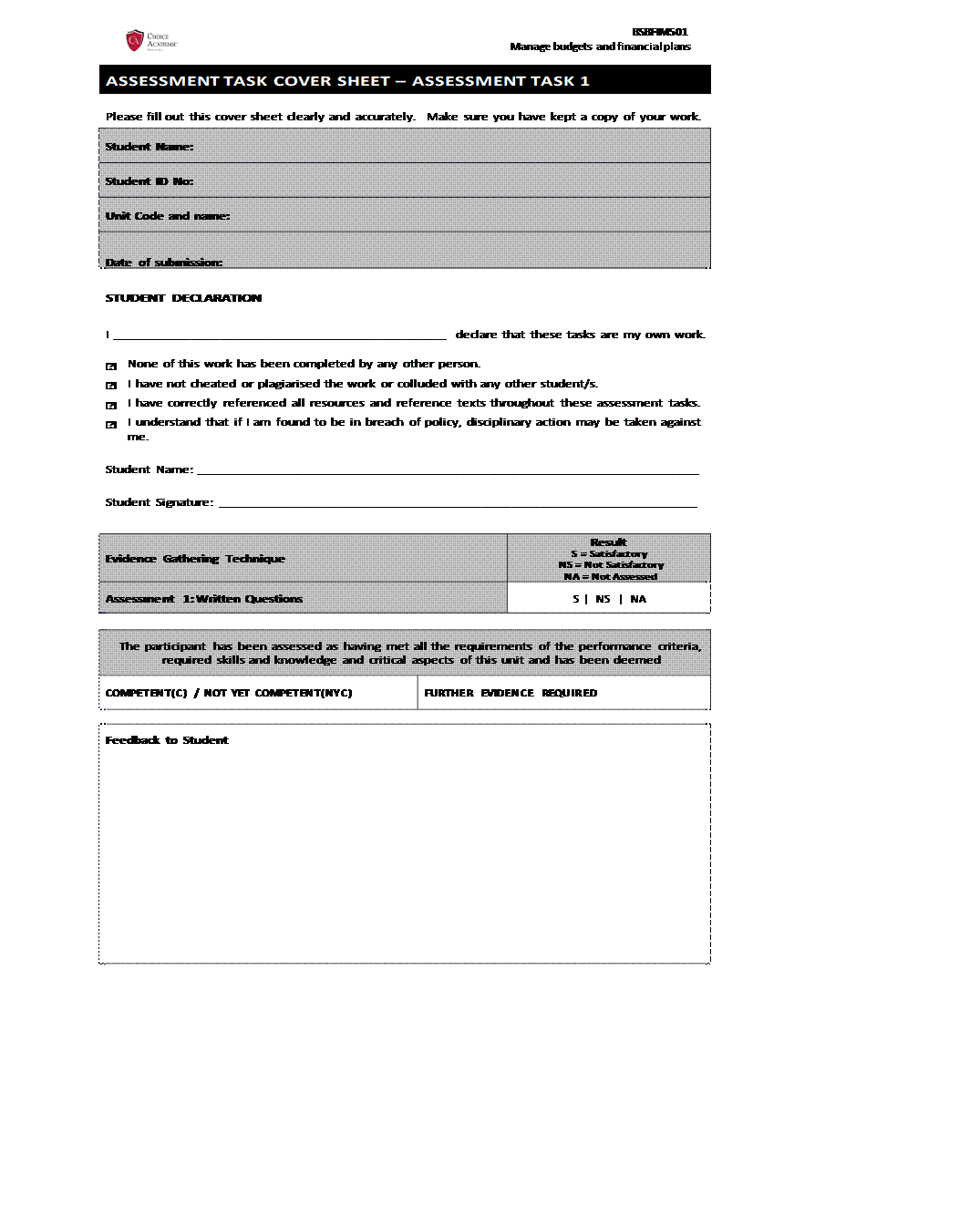
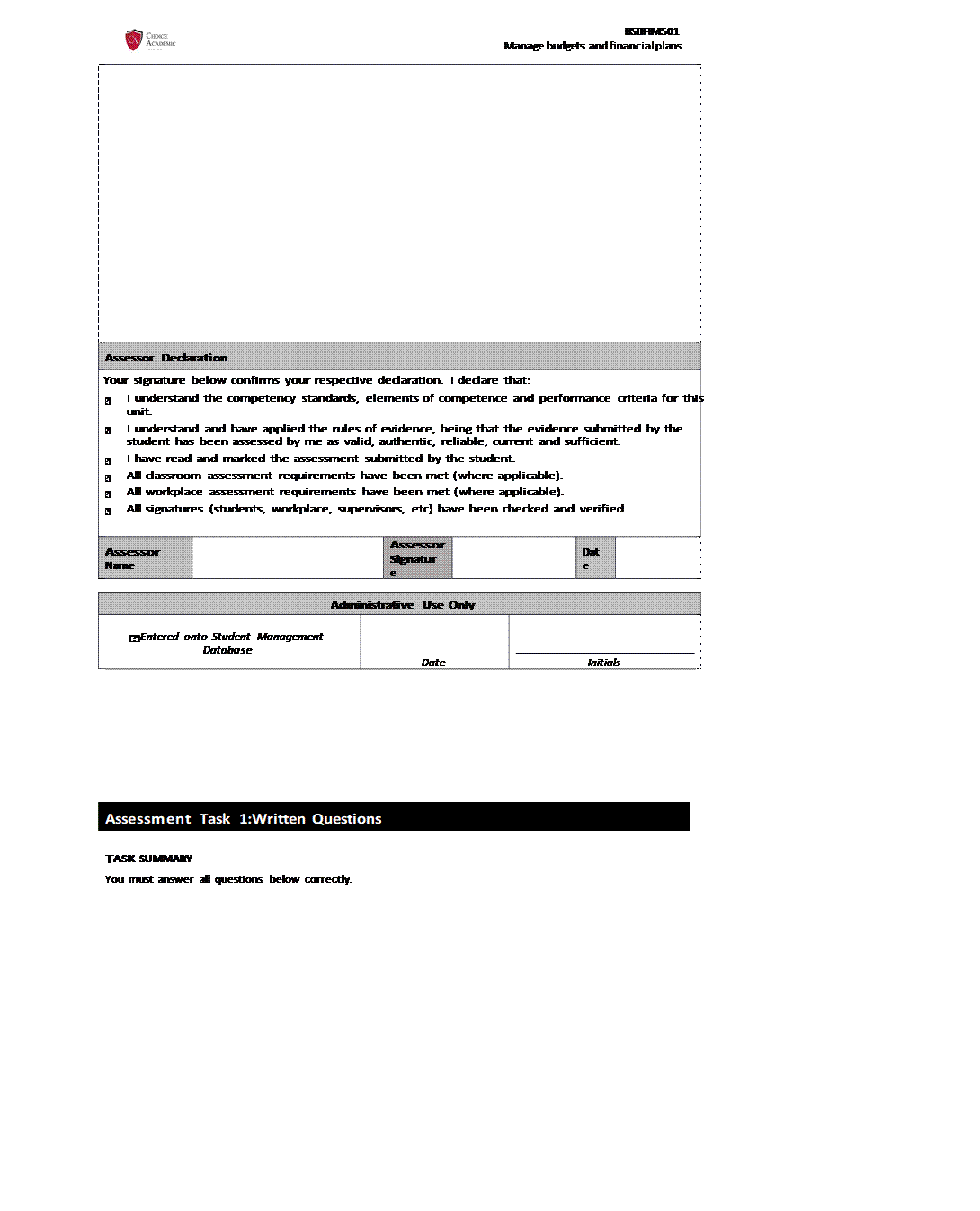
RESOURCESANDEQUIPMENTREQUIREDTOCOMPLETETHISTASK:
Access to textbooks and other learning materials
Access to a computer with Internet
Access to a word processor
WHENANDWHEREWILLTHISTASKBECOMPLETED?
This task may be done in your own time as homework or you may be given time to do this task in class (where applicable).
Your assessor will provide you with the due date for this assessment.
WHATHAPPENSIF I GETSOMETHINGWRONG?
If your assessor marks any of your answers as incorrect/incomplete, they will make arrangements with you about resubmission. Your assessor may ask you some questions verbally to check your understanding, or you may need to provide new written responses to the questions that were answered incorrectly/incompletely. Your assessor will give you a due date by which this must be provided.
STUDENTINSTRUCTIONSFOR TASK 1
This is an open book test – you can use your learning materials as reference.
You must answer all questions in this task correctly and completely.
You must answer the questions by typing your answers in a word processor such as Microsoft Word or similar program.
WRITTENANSWERQUESTIONGUIDANCE
The following written questions may use a range of ‘instructional words’, such as ‘identify’ or ‘explain’. These words will guide you as to how you should answer the question. Some questions will also tell you how many answers you need to give – for example, ‘Describe three strategies…’.
Describe – when a question asks you to ‘describe’, you will need to state the most noticeable qualities or features. Generally, you are expected to write a response of two or three sentences in length.
Explain – when a question asks you to ‘explain’, you will need to make clear how or why something happened or the way it is. Generally, you are expected to write a response of two or three sentences in length.
Identify – when a question asks you to ‘identify’, you will need to briefly describe the required information. Generally, you are expected to write a response of two or three sentences in length.
List – when a question asks you to ‘list’, this means you will need to briefly state information in a list format, often with a specific number of items indicated.
Outline – when a question asks you to ‘outline’, this means giving only the main points. Generally, you are expected to write a response of two or three sentences in length.
Summarise – when a question asks you to ‘summarise’, this is similar to ‘outline’, only giving the main points. Generally, you are expected to write a response of two or three sentences in length.
QUESTION 1
Describe what the principle of ‘double entry accounting’ means? (minimum 50 words)

Describe what the ‘accounting entity convention’ means? (minimum 50 words)

Describe what the ‘accrual principle’ means? (minimum 50 words)

Describe what the ‘accounting equation’ means? (minimum 50 words)

5
Provide a brief summary of what each of the following legislation acts is designed to achieve:
Income Tax Assessment Act 1997
Fringe Benefits Tax Assessment Act 1986
Superannuation Act 1976
A New Tax System (Goods and Services Tax) Act 1999
(minimum 50 words to each response)

Explain who must register for GST within Australia (no more than 50 words).

7
Summarise what information must be provided in a Business Activity Statement (BAS) (minimum 50 words).

Within Australia, how long must an individual or business keep their financial records for? (no more than 50 words)

Identify four types of records that you must keep for tax purposes (no more than 50 words).

10
According to the Corporations Act 2001, who must be have an annual audit conducted? (no more than 50 words).

 |

Outline a process that can be used to develop a budget (minimum 50 words).

Describe what a cash flow statement is? (minimum 50 words)
14
List three techniques that can be used to improve a business’s cash flow (minimum 50 words).

Describe what a spreadsheet is, and how it can be used to manage financial records (minimum 50 words).

What is the GST rate for goods or services that attract GST? (no more than 40 words)

17
Describe why journal and ledger are used for in accounting in a business? (minimum 50 words).

Describe what each of the following financial statements are used for:
Balance sheet
Income statement (Profit & Loss Statement)
Cash-flow statement

19
Explain the technique for calculating the ‘Cost of Goods Sold’ in a Profit & Loss Statement (no more than 50 words).


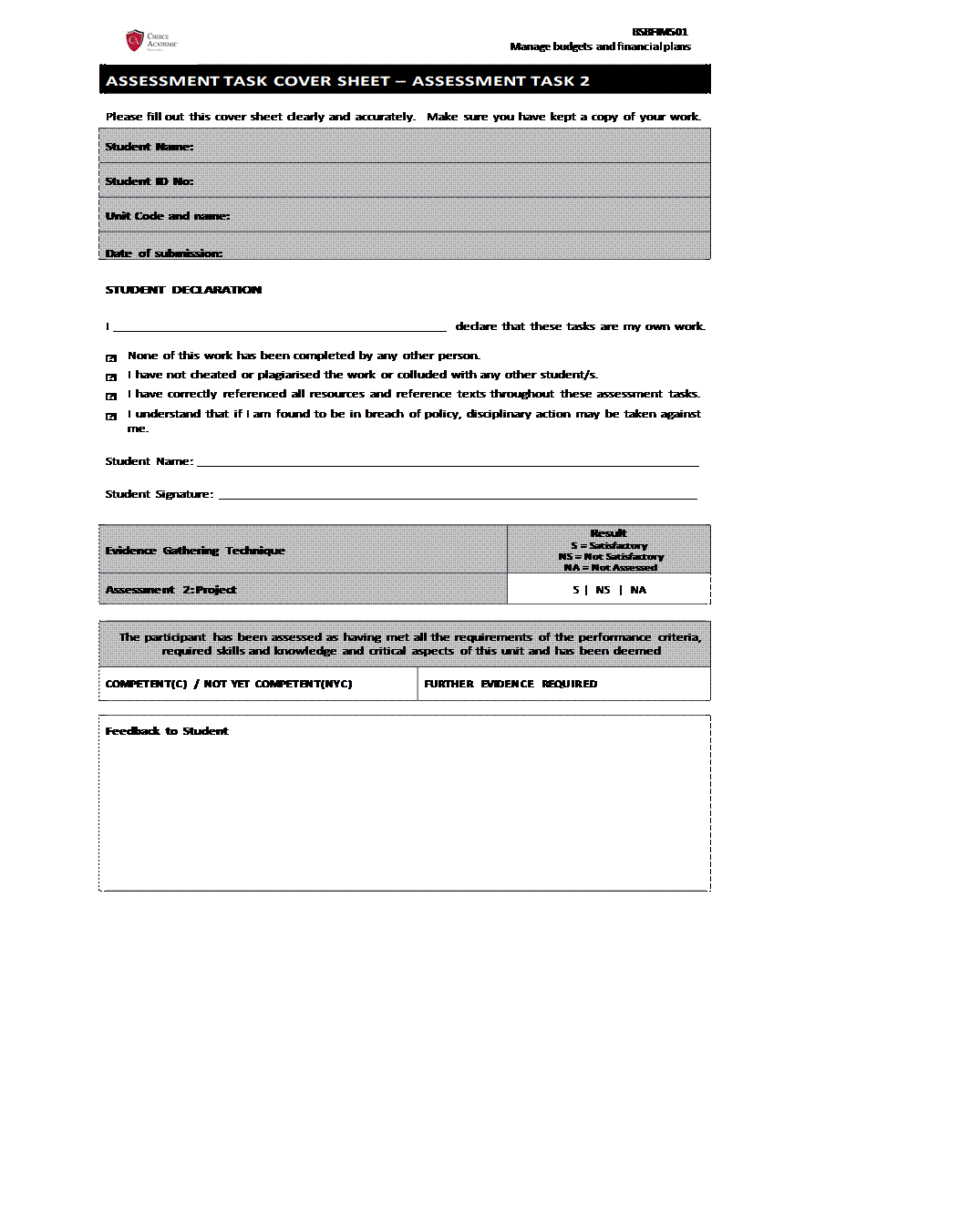
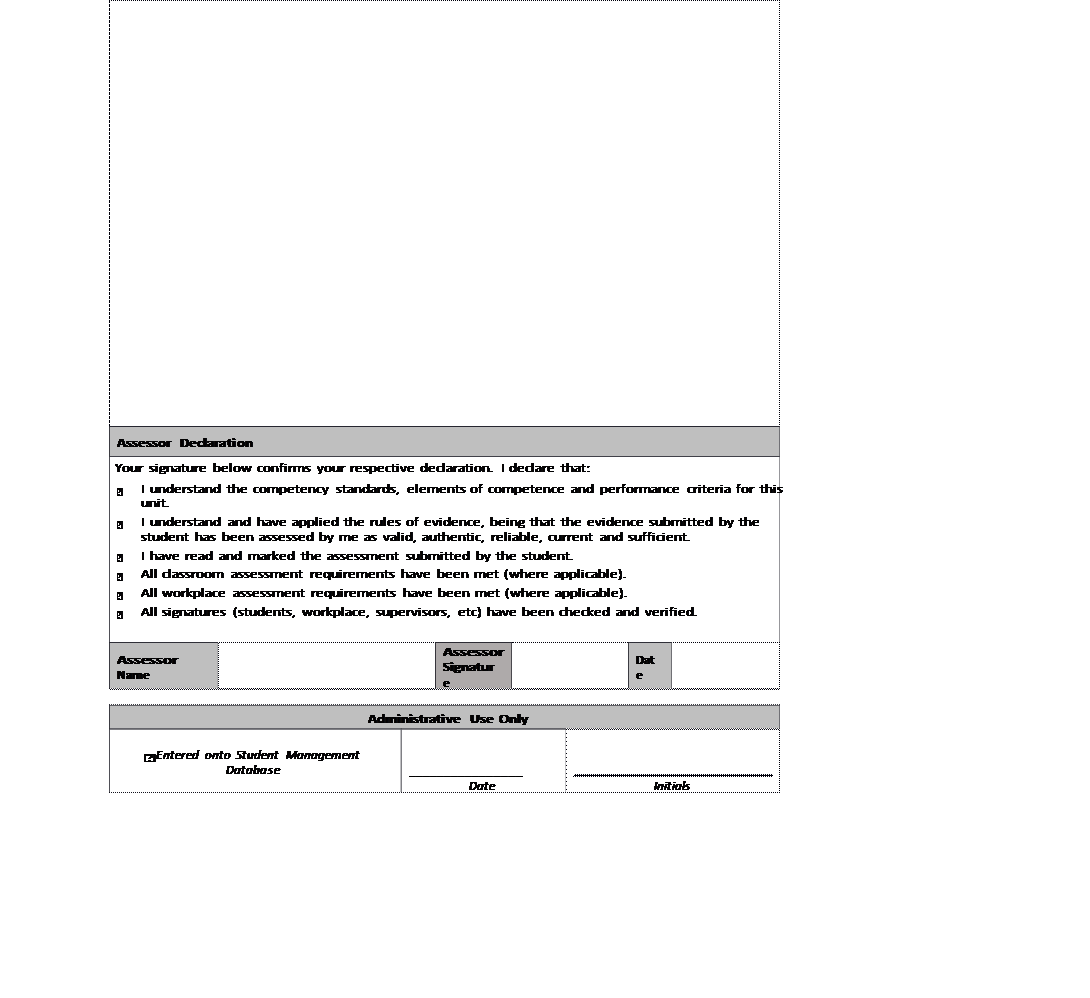
BSBFIM501
Manage budgets and financial plans
Assessment Task 2: Plan and Implement Budget
The following assessment tasks use a simulated business called Complete Business Solutions Australia (CBSA). In order to complete the assessment tasks, you will need to access information, templates, policies and procedures found on the CBSA website. Your assessor will provide you login details. Navigate to www.cbsa.com.au, select ‘Log in’ and enter your username and password prior to completing this assessment tasks.
 For this assessment you will play the role of Chief Financial Officer for CBSA. CBSA is a consultancy service providing assistance with compliance, finances, human resources, information technology and other business needs to ensure that businesses have the expertise and support they need to survive and prosper. You should familiarise yourself with CBSA activities including its services and history, the organisational structure of the business and its employees. Ensure that you read the Business Plan to understand CBSA’s mission, vision, and business objectives.
For this assessment you will play the role of Chief Financial Officer for CBSA. CBSA is a consultancy service providing assistance with compliance, finances, human resources, information technology and other business needs to ensure that businesses have the expertise and support they need to survive and prosper. You should familiarise yourself with CBSA activities including its services and history, the organisational structure of the business and its employees. Ensure that you read the Business Plan to understand CBSA’s mission, vision, and business objectives.
TASKSUMMARY
There are three parts to this task:
In Part A, you will take part in a budget meeting
In Part B, you will develop contingency plans for the budget
In Part C, you will distribute the budget to team members
RESOURCESANDEQUIPMENTREQUIREDTOCOMPLETETHISTASK:
Access to textbooks and other learning materials
Access to a computer, the Internet, and a web browser
Access to a word processor
CBSA organisational policies and procedures (accessible via the CBSA website)
Email template (accessible via the CBSA website)
Contingency Plan Template (accessible via the CBSA website)
Marketing Budget – 20XX (accessible via the CBSA website)
Profit and Loss Statement - 20XX (accessible via the CBSA website)
Cash Flow Statement – 20XX (accessible via the CBSA website)
GST Summary – 20XX (accessible via the CBSA website)
WHENANDWHEREWILLTHISTASKBECOMPLETED?
This task may be done in your own time as homework or you may be given time to do this task in class (where applicable).
Your assessor will provide you with the due date for this assessment.
WHATHAPPENSIF I GETSOMETHINGWRONG?
If you get something wrong, you will need to resubmit that part of the task that has not been completed correctly or fully. Your assessor will provide you with guidance as to what needs to be resubmitted and how.
STUDENTINSTRUCTIONSFOR TASK 2
Complete all parts of the assessment below.
PART A – BUDGETING MEETING
![]()
To begin this part, read the following email and then complete the tasks that follow:
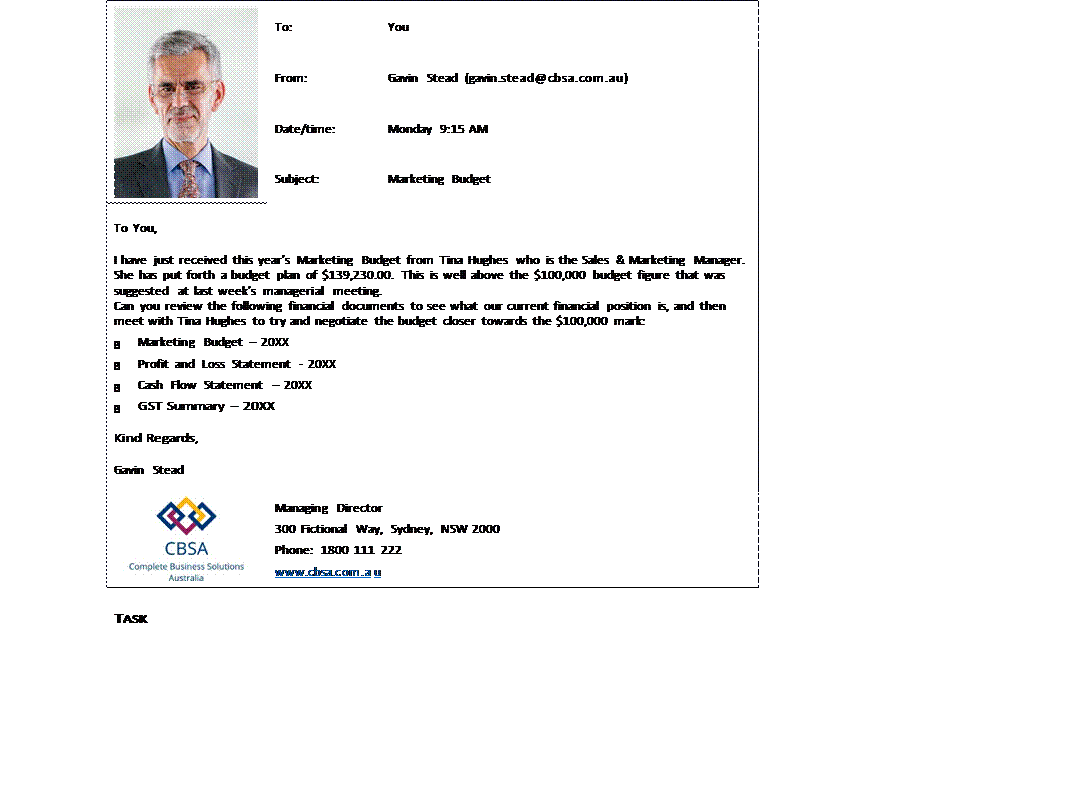
Note: In the email documents that contain ‘20XX’ should be taken as the current financial year.
In this task you need to first review the financial documents via the CBSA website specified in the email, and then meet with Tina Hughes to discuss the Marketing Budget she has submitted. For this assessment task, an assessor will play the role of Tina Hughes. During the meeting you need to:
Use active listening and questioning to clarify what each of the marketing campaigns are
Use oral skills to present the General Manager’s viewpoint of the $100,000 budget amount
Negotiate with Tina Hughes to try and get the budget down to $100,000
Revise the budget based on negotiations
Confirm with Tina that she believes that the finalised budget is achievable, accurate and comprehensible

To begin this part, read the following email and then complete the tasks that follow:
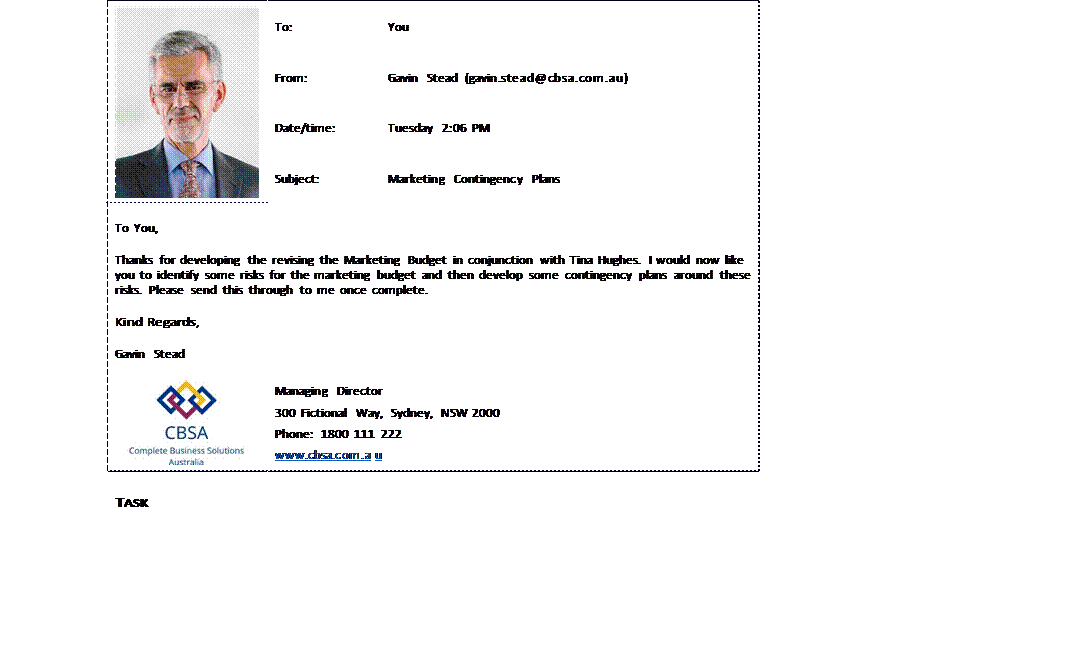
Based on the email, you are to review the organisational Risk Management Policy & Procedures and then develop contingency plans using the Contingency Plan Template.
To do this, within the Contingency Plan you need to identify two business risks of the Marketing Budget and for each:
Determine the impact of the risk
Determine the likelihood of the risk occurring
Determine a mitigation strategy to try and avoid or limit the damage of the risk
Determine a contingency plan if the risk occurs
![]()
To begin this part, read the phone message left on your work phone, and then complete the task that follows:
‘Hi You. Thanks for developing contingency plans for the Marketing Budget. Can you now distribute the Contingency Plans along with the Marketing
Budget to the Sales & Marketing team members?
Gavin Stead – Managing Director Please make sure that you highlight the risks and
contingency plans for those risks so that staff have a support tool when implementing the
TASK Marketing Budget effectively. Thanks, Gavin.’
Based on the phone message, you are to draft an email to the Sales & Marketing team using the organisation’s
 Email Template . To do this, use a word processor to develop an email using the Email Template (downloadable from the Employee section of the CBSA website) to distribute Marketing Budget and the Contingency Plan to the Sales & Marketing team. The email must:
Email Template . To do this, use a word processor to develop an email using the Email Template (downloadable from the Employee section of the CBSA website) to distribute Marketing Budget and the Contingency Plan to the Sales & Marketing team. The email must:
Specify who the email is to
Specify who the email is from
Specify the date and time you sent the email
Specify the subject
Specify the attachments of the Marketing Budget and the Contingency Plan
Contain a body part of the email detailing why you are sending this email, and how the Contingency Plan is to support implementing the Marketing Budget
Complete the email footer specifying the job position you are role playing

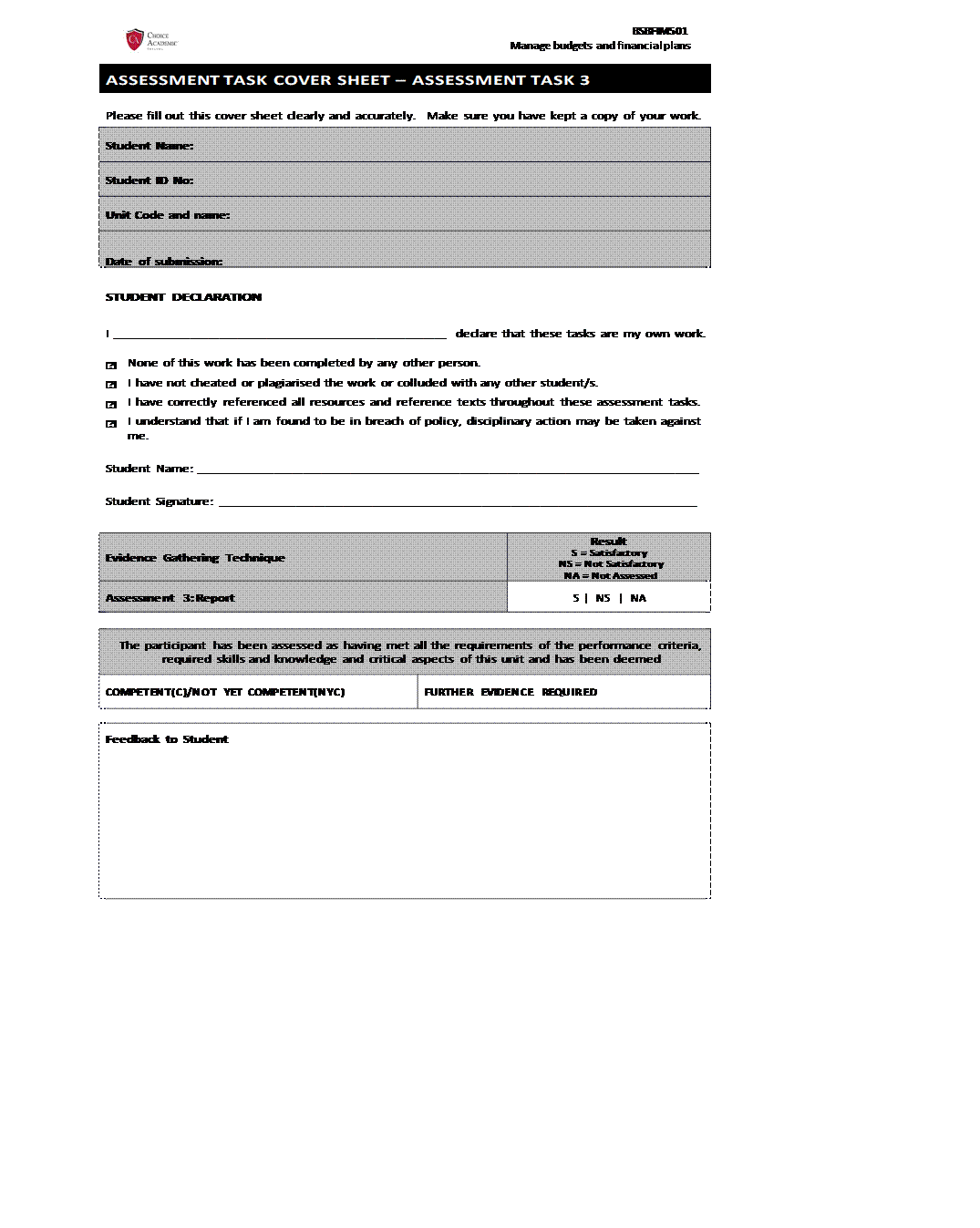
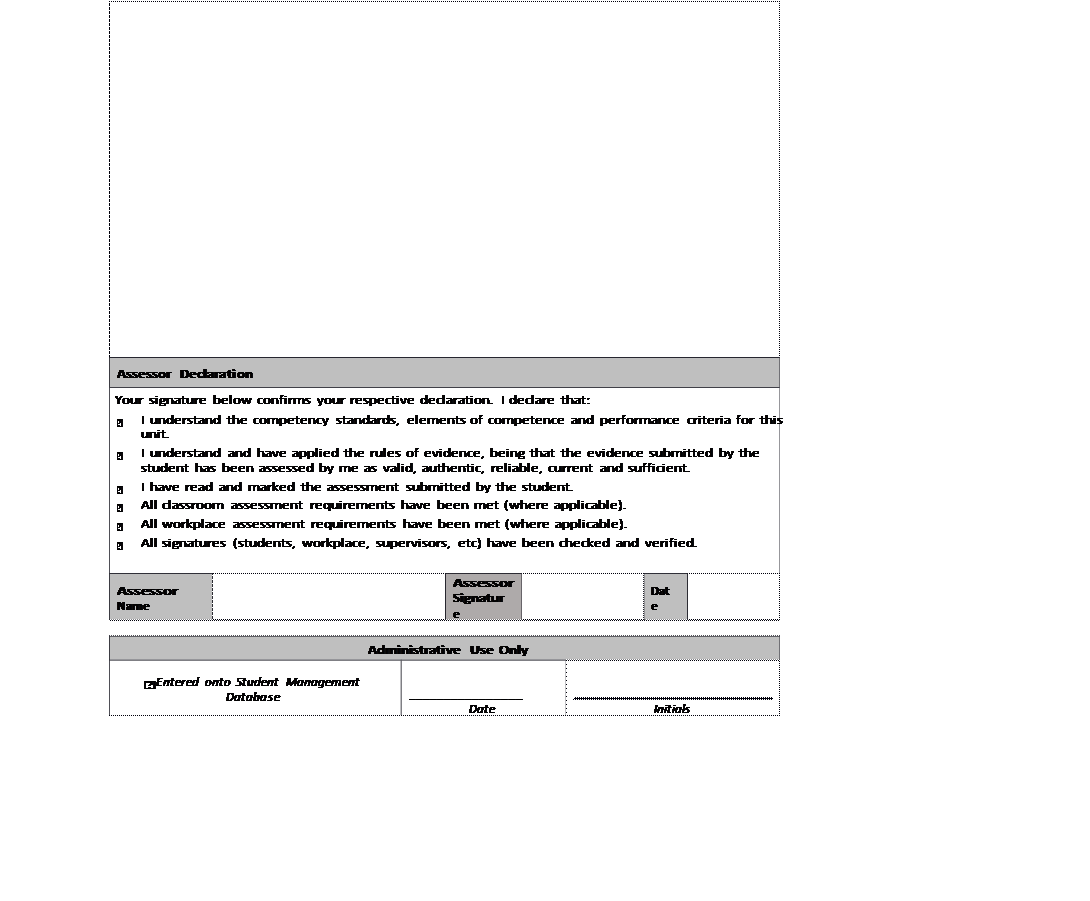
Assessment Task 3: Monitor, Control and Review Financial Processes
TASKSUMMARY
There are three parts to this task:
In Part A, you will implement a monitoring process and report on budget expenditure
In Part B, you will review and improve a financial management process In Part C, you will monitor agreed improvements to determine if they are working
RESOURCESANDEQUIPMENTREQUIREDTOCOMPLETETHISTASK:
Access to textbooks and other learning materials
Access to a computer, the Internet, and a web browser
Access to a word processor
Marketing Budget (developed in the previous Assessment Task)
Contingency Plan (developed in previous Assessment Task)
CBSA organisational policies and procedures (accessible via the CBSA website)
Petty Cash Log – Month 20XX (accessible via the CBSA website)
Aged Debtor Report A - Month 20XX (accessible via the CBSA website) Aged Debtor Report B - Month 20XX (accessible via the CBSA website)
WHENANDWHEREWILLTHISTASKBECOMPLETED?
This task may be done in your own time as homework or you may be given time to do this task in class (where applicable).
Your assessor will provide you with the due date for this assessment.
WHATHAPPENSIF I GETSOMETHINGWRONG?
If you get something wrong, you will need to resubmit that part of the task that has not been completed correctly or fully. Your assessor will provide you with guidance as to what needs to be resubmitted and how.
STUDENTINSTRUCTIONSFOR TASK 3
Complete all parts of the assessment below.
![]()
To begin this part, read the following email and its attachment, then complete the tasks that follow:
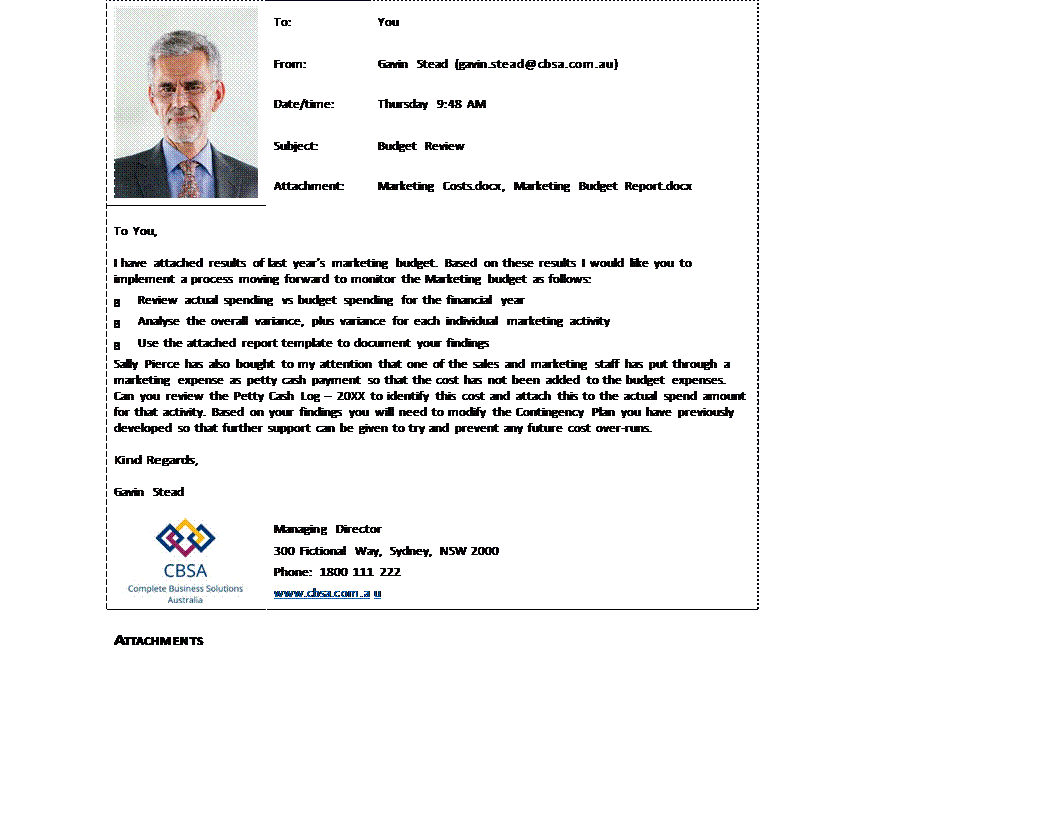
Marketing Costs.docx
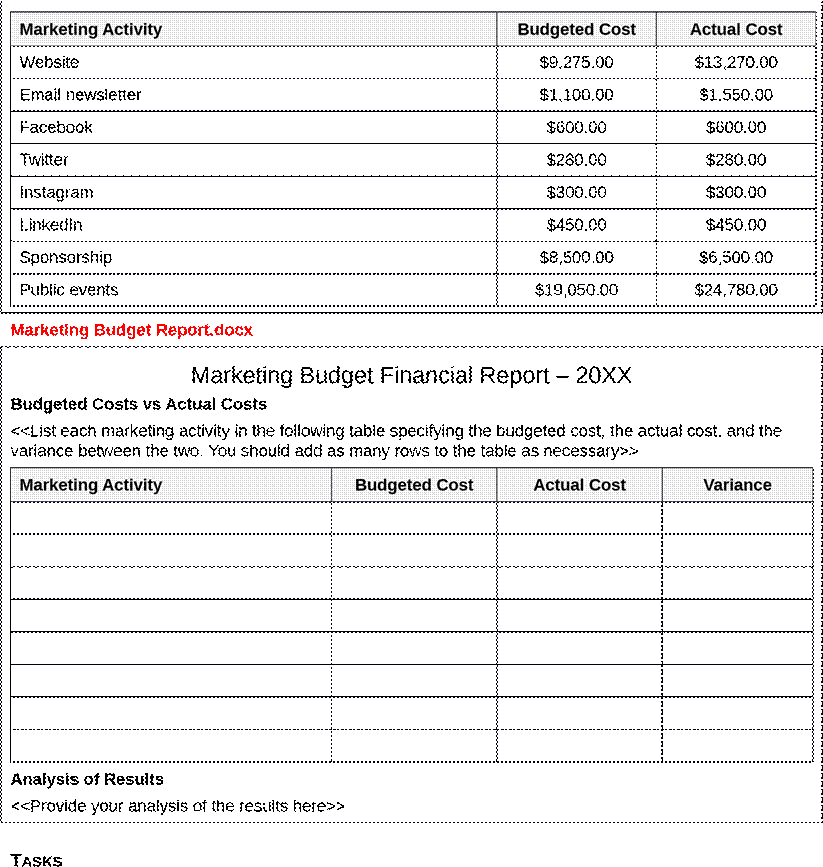
Based on the email and the attachments, you are to complete the following tasks:
1. Develop the Marketing Budget Financial Report – 20XX using the supplied template, and the results of the Marketing Costs document including:
Mapping budget costs vs actual costs giving a variance for each marketing activity
Providing a summarised analysis of the results
As marketing activities will be different for your marketing budget depending on what was negotiated in the previous assessment task, you should apply the following cost overrun rates to:
A 5% cost overrun to any individual activities in the Advertising campaign type
A 10% cost overrun to any individual activities in the Sales campaign type
2. Modify the Contingency Plan you have previously developed to provide better support to the sales and marketing team. Delete any text within the ‘<<’ and ‘>>’ with your data and analysis.
![]()
To begin this part, read the following email and then complete the tasks that follow:
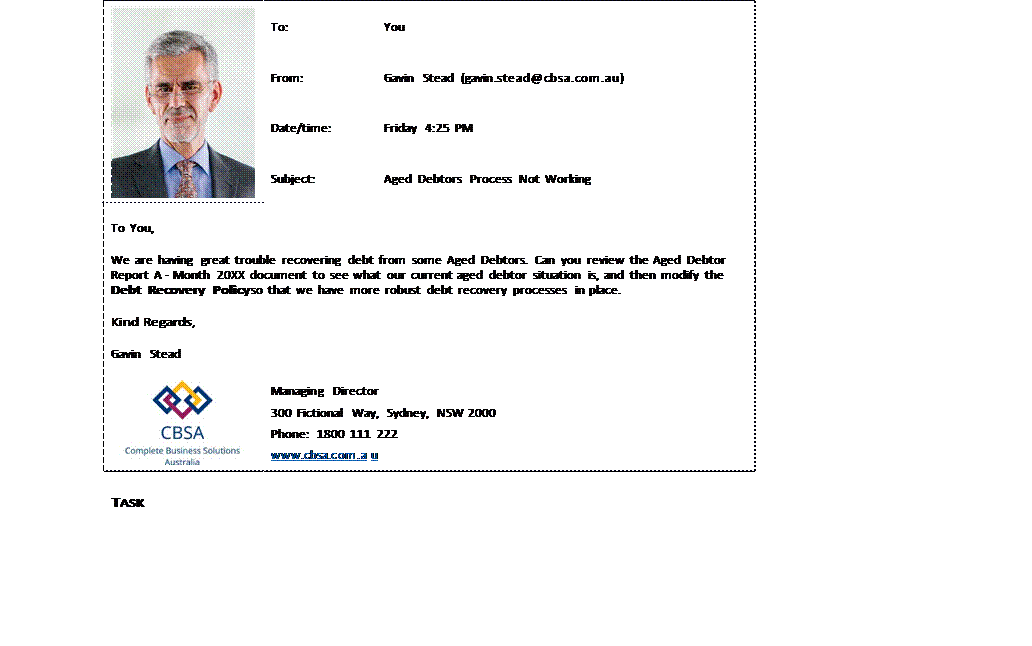
Based on the email, first review the Aged Debtor Report B - Month 20XX document to determine what the current aged debtors’ situation is, and then modify the organisational Debt Recovery Policy to strengthen processes around debt recovery.
![]() PART C – IMPLEMENTAND MONITOR AGED DEBTORS PROCESS IMPROVEMENTS
PART C – IMPLEMENTAND MONITOR AGED DEBTORS PROCESS IMPROVEMENTS
To begin this part, read the following email and its attachment, then complete the tasks that follow:
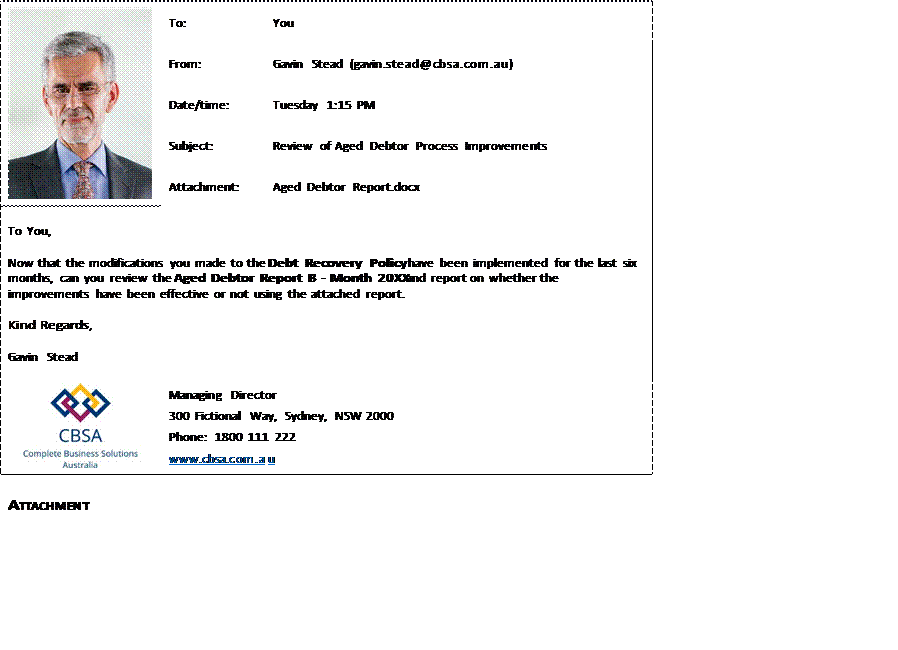
Aged Debtor Report.docx
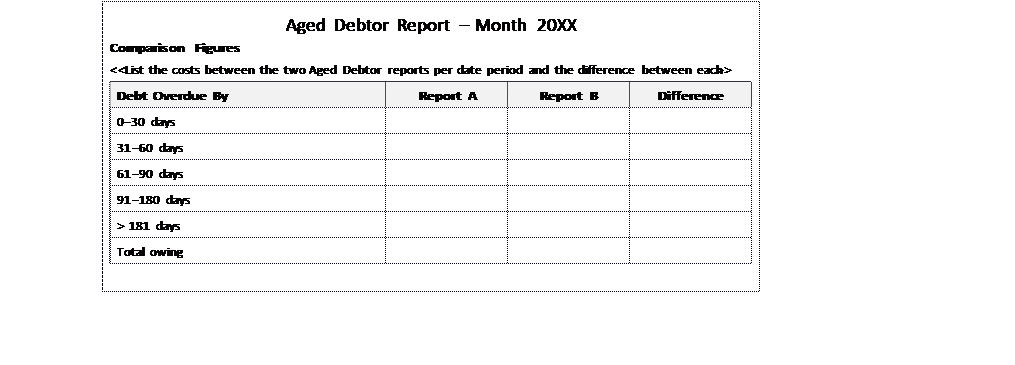

TASK
Based on the email, and the attachment, you are to complete the following task:
Develop the Aged Debtor Report – Month 20XX using the supplied template, and the two Aged Debtor Reports (A and B) to:
Specify the amount owed for each time period for the two reports
The difference between the amounts for each period
A brief analysis of the figures specifying whether improvements have been made or not



